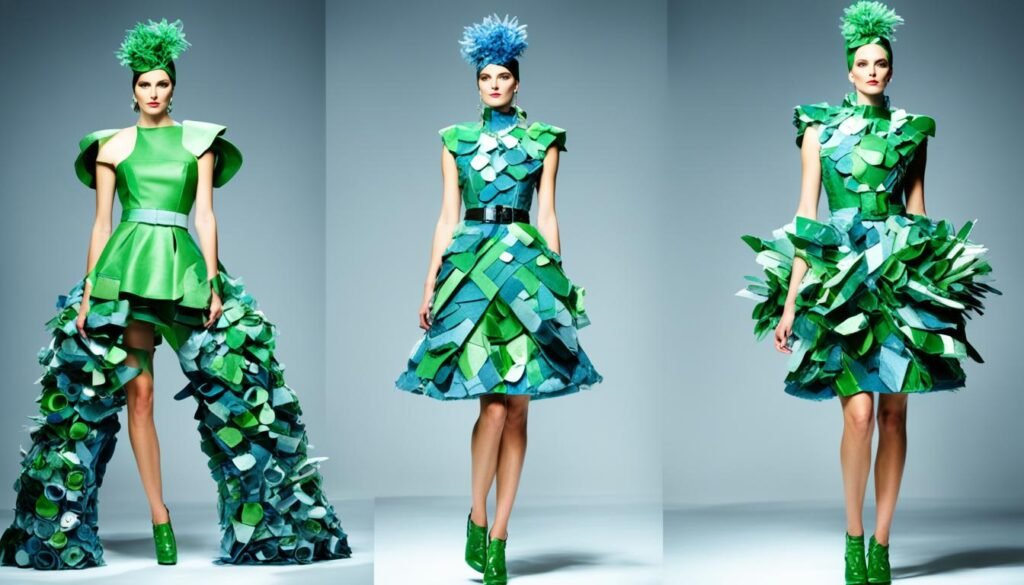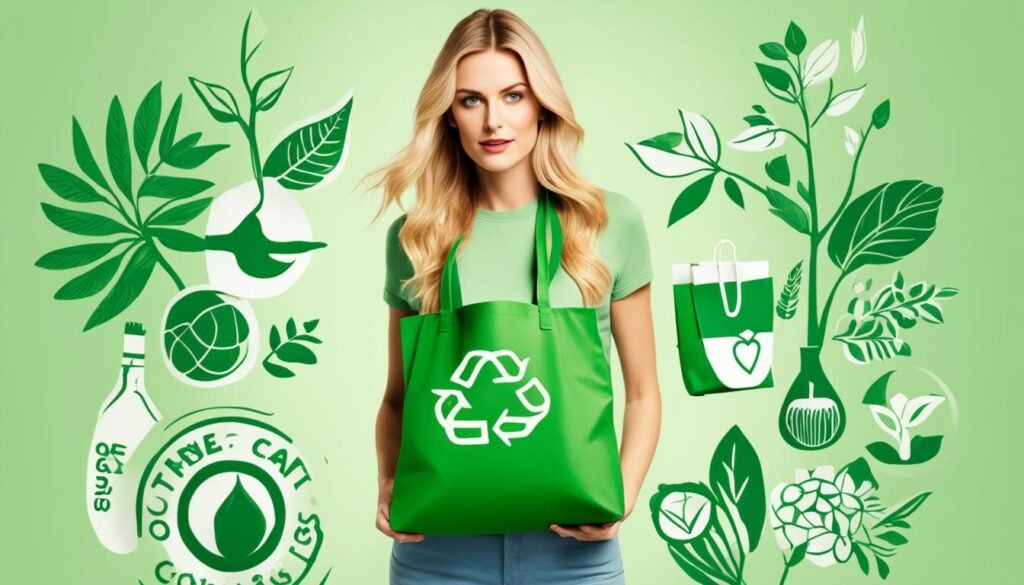Sustainable and eco-conscious clothing options are in high demand. People want green outfits that look great and match their environmental values. The sustainable fashion world offers diverse choices for all styles and events.
You can find eco-friendly options for casual weekends, office wear, and fancy evenings. These clothes cater to different style preferences while being responsibly made.
Key Takeaways
- Discover a wide array of stylish green outfits for every occasion, from casual to formal
- Explore the rise of eco-conscious consumerism and the importance of sustainable fashion
- Learn about the benefits of organic fabrics, ethical fashion brands, and recycled materials
- Understand the slow fashion movement and the value of quality over quantity
- Gain insights into the future of green fashion and how to incorporate it into your wardrobe
Embracing Sustainable Fashion
The fashion industry’s environmental impact has sparked a movement towards sustainable choices. Eco-conscious consumerism is rising as people invest in green outfits. These choices reduce carbon footprints and support environmentally-friendly practices.
The Rise of Eco-Conscious Consumerism
Consumers now seek sustainable fashion brands that prioritize ethical and eco-friendly production. This shift has increased demand for sustainable fashion. Many brands now offer more eco-friendly clothing and accessories.
Why Green Outfits Matter
Green outfits made from organic, recycled, or responsibly-sourced materials significantly impact the environment. They reduce waste and conserve natural resources. These stylish choices contribute to a more circular economy.
“Sustainable fashion is not just a trend, but a lifestyle choice that can make a real difference in the world.”
Eco-conscious consumerism and green outfits have ushered in a new fashion era. This shift prioritizes sustainability, ethics, and environmental responsibility. The fashion industry continues to evolve, offering more sustainable style options.
As more people embrace sustainable fashion, they express personal style positively. This movement makes a lasting impact on our planet’s health.
Exploring Organic Fabrics
Organic fabrics are eco-friendly textiles that shine in sustainable fashion. These natural fibers include organic cotton, linen, and bamboo. They offer many benefits for conscious consumers.
Organic cotton grows without synthetic pesticides and fertilizers. This reduces its environmental impact. It’s soft, durable, and breathable, perfect for everyday wear.
Linen comes from the flax plant. It’s highly sustainable and needs minimal water. Fewer resources are required to cultivate linen.
Bamboo is a versatile organic fabric gaining popularity. This fast-growing grass is naturally antibacterial and hypoallergenic. It’s incredibly soft, making it a great alternative to synthetic materials.
- Organic cotton: Grown without synthetic pesticides and fertilizers, offering a more eco-friendly alternative to conventional cotton.
- Linen: A durable, breathable fabric made from the flax plant, requiring minimal resources to produce.
- Bamboo: A fast-growing, antibacterial, and hypoallergenic fabric that is gentle on the skin and the environment.
These organic fabrics lessen the environmental impact of textile production. They also provide superior quality and comfort. By choosing organic materials, we support sustainable and ethical practices.
“Organic fabrics are the future of sustainable fashion, offering a more ethical and environmentally-friendly alternative to traditional textiles.”
The demand for sustainable fashion keeps growing. Organic fabrics are now a key force in the industry. These natural fibers offer stylish and eco-conscious options.
Ethical Fashion Brands to Watch
Sustainable and socially conscious fashion is on the rise. Ethical fashion brands are creating stylish, eco-friendly clothing. These brands focus on reducing environmental impact and promoting fair practices.
They prioritize transparent supply chains and fair trade. Many also offer vegan certifications. Let’s look at some top ethical fashion brands worth watching.
Transparent Supply Chains
Transparency is key in ethical fashion. Everlane provides detailed info about their factories and production processes. This helps customers make informed choices.
Reformation also commits to transparency. They share the environmental impact of each item in their collection.
Fair Trade and Vegan Certifications
Ethical brands prioritize fair trade and vegan certifications. Pact, a certified B-Corp, ensures fair wages and safe working conditions. They support organic cotton farmers and garment workers globally.
Veja proudly displays its vegan and fair trade certifications. This showcases their commitment to ethical and sustainable practices.
| Brand | Certifications | Key Sustainable Practices |
|---|---|---|
| Everlane | Transparent supply chain | Ethical factories, sustainable materials |
| Reformation | Transparent supply chain, sustainable materials | Recycled fabrics, zero-waste production |
| Pact | Fair trade, organic cotton | Fair wages, safe working conditions |
| Veja | Fair trade, vegan | Recycled and organic materials, fair labor practices |
Supporting these ethical fashion brands aligns with sustainability values. Your green outfits can be both stylish and socially responsible. Feel confident in your fashion choices that make a positive impact.
Recycled Materials: A Stylish Solution
The fashion industry is embracing a sustainable revolution. Waste is being transformed into stylish, eco-friendly outfits. Innovative use of recycled materials is reshaping our approach to fashion.
Upcycling and Repurposing Fabrics
Upcycling and repurposing fabrics are game-changers in sustainable fashion. Designers breathe new life into discarded textiles. They create unique garments that look fabulous and reduce waste.
Skilled techniques transform recycled materials into stunning upcycled fashion pieces. These garments are both fashionable and environmentally conscious. Repurposed fabrics tell a unique story in each piece.
Designers see potential in what others might consider waste. Fashion lovers can choose stylish looks that help the environment. This sustainable approach contributes to a more eco-friendly future.

“Recycled materials have the power to transform the fashion industry, ushering in a new era of stylish and sustainable clothing.”
The demand for recycled materials in fashion keeps growing. The industry offers many options for conscious consumers. Eco-friendly resources are reshaping how we dress.
Sustainable fashion is becoming a chic and accessible choice. From statement pieces to everyday essentials, recycled materials are everywhere. This trend is making stylish, eco-friendly clothing available to all.
Plant-Based Dyes: A Natural Approach
The fashion industry is embracing plant-based dyes for eco-friendly coloring. These dyes offer vibrant hues while reducing environmental impact. Unlike synthetic dyes, this natural alternative provides a greener solution for clothing production.
Natural dyes have a rich history spanning centuries. The woad plant yields deep indigo shades. Madder root produces earthy tones. These plant-based coloring options open up sustainable fashion possibilities.
| Natural Dye | Color Range | Sourcing |
|---|---|---|
| Indigo | Blues, from pale to deep navy | Woad plant, Indigofera tinctoria |
| Madder | Reds, pinks, oranges | Madder root (Rubia tinctorum) |
| Turmeric | Vibrant yellows | Turmeric root (Curcuma longa) |
Plant-based dyes offer versatility in fashion design. Designers can create vibrant everyday outfits and sophisticated formal wear. This natural approach to coloring promotes a more sustainable fashion future.
“The beauty of plant-based dyes lies in their ability to paint a canvas of colors that are as unique as the plants that produce them.”
Green Outfits for Every Occasion
Green outfits can be stylish and versatile. Sustainable fashion offers many options to elevate your style. You can make eco-conscious choices for both casual and office-friendly looks.
Casual Chic
Try pairing an organic cotton t-shirt with linen trousers in soft green. Add a recycled denim jacket for a laid-back, sophisticated touch.
Complete the look with a woven tote bag and vegan-friendly sneakers. This creates an effortless, casual green fashion ensemble.
Office-Friendly Ensembles
Green outfits can work well in the workplace. Pair a tailored green blazer with a crisp white button-down shirt.
Add a high-waisted, recycled polyester skirt for a polished look. Finish with sustainable leather pumps and an eco-friendly briefcase.
Green outfits can make a positive environmental impact. You can express your personal style with sustainable fashion choices.
The Slow Fashion Movement
Slow fashion offers a mindful alternative to disposable clothing. It emphasizes quality over quantity and promotes garment longevity. This approach helps create a stylish wardrobe that aligns with personal values.
Quality over Quantity
Slow fashion believes that less is more. It encourages investing in high-quality, well-crafted pieces that last for years. Consumers are urged to consider purchases carefully and choose timeless designs over fleeting trends.
This approach reduces waste and deepens appreciation for our clothes. Slow fashion brands focus on craftsmanship, using traditional techniques and premium materials. This ensures garments are built to last, reducing environmental impact.
“Slow fashion is not just about fashion, it’s about our lifestyle, our choices, and our impact on the planet.”
The slow fashion movement is gaining traction among consumers. People are recognizing the value of quality over quantity. This approach helps individuals look their best while contributing to a sustainable future.
Conscious Consumerism: A Lifestyle Choice
Embracing green outfits goes beyond clothing choices. It’s a lifestyle that aligns with your values. Conscious consumerism helps you make ethical and eco-friendly decisions in daily life.
Our consumer choices impact the planet and people. By adopting a sustainable lifestyle, you support businesses that prioritize ethical fashion. This contributes to positive change in the industry.
- Prioritize quality over quantity when building your wardrobe, investing in timeless, durable pieces that will last.
- Research and support ethical fashion brands that are transparent about their supply chains and manufacturing processes.
- Explore upcycling and repurposing as a way to give new life to pre-owned clothing, reducing waste and promoting circularity.
Conscious consumerism is more than a trend. It’s a lifestyle that impacts the environment and communities. Your mindful decisions can inspire others to join the movement.
“Conscious consumerism is about making choices that align with your values and the greater good. It’s a powerful way to drive positive change, one purchase at a time.”

This approach can transform fashion and other industries. Supporting ethical brands creates a more sustainable future. Together, we can make a difference through our consumer choices.
Styling Tips for Green Outfits
Eco-friendly accessories can enhance your sustainable fashion choices. They showcase your commitment to conscious consumerism. These additions effortlessly elevate your green outfits.
Accessorizing with Eco-Friendly Pieces
The right accessories can transform green outfits. Eco-friendly accessories complement sustainable fashion beautifully. Let’s explore some options.
- Reusable tote bags made from organic cotton or recycled materials
- Wooden or bamboo jewelry pieces
- Belts and bags crafted from vegan leather alternatives
- Scarves and wraps in natural fibers like linen or hemp
These accessories boost the appeal of your green outfits. They also reinforce your eco-conscious lifestyle. Thoughtful choices make a big impact.
Balance is key in styling ethical fashion. Mix your sustainable pieces with stylish eco-friendly accessories. This approach lets you look great while upholding your values.
Influencers and Trendsetters in Sustainable Fashion
Eco-conscious influencers are leading the sustainable fashion movement. These trendsetters inspire consumers to make mindful style choices. They advocate for responsible materials, ethical labor, and transparent supply chains.
Aditi Mayer is a trailblazing fashion writer and photographer. She highlights ethical and sustainable brands on her platform. Mayer showcases chic green outfits and emphasizes fair trade and organic fabrics.
Pallavi is another influential voice in sustainable fashion. She educates her audience about the environmental impact of fast fashion. Through social media and her blog, Pallavi promotes sustainable alternatives aligned with her values.
| Sustainable Fashion Influencer | Key Focus Areas |
|---|---|
| Venetia La Manna | Ethical fashion, fair labor practices, circular economy |
| Aja Barber | Sustainable fashion, intersectional environmentalism, mindful consumerism |
These sustainable fashion influencers are redefining industry standards. They inspire conscious consumers to make informed clothing choices. Their efforts promote ethical production and eco-friendly materials for a sustainable fashion future.
“Fashion has the power to create change, and that’s why I’m so passionate about sustainability in the industry. It’s not just about the clothes – it’s about the people, the planet, and the entire ecosystem behind it.”
– Venetia La Manna, Sustainable Fashion Influencer
The Future of Green Fashion
The fashion industry is shifting towards eco-friendly clothing. This green transformation is shaping sustainable fashion. New trends and innovations are emerging in this exciting movement.
Innovative fabric technologies are leading the future of green fashion. Designers now use renewable and biodegradable materials for stylish, eco-friendly garments. These include organic cotton, hemp, and recycled polyester.
The circular economy is another key trend in fashion. It replaces the “take, make, and waste” model. Instead, clothes are designed for longevity, repair, and recycling.
This shift towards sustainable fashion trends reduces waste. It also promotes mindful consumption among shoppers.
Technology is transforming green fashion. 3D-printed garments and digital clothing are changing design and production. These innovations are reshaping how we consume fashion.
Consumer demand for sustainable fashion is growing. The industry must adapt to meet new expectations. Brands focusing on transparency and ethics will thrive in green fashion.
| Emerging Trends | Impact on Sustainable Fashion |
|---|---|
| Renewable and Biodegradable Fabrics | Reduced environmental impact and increased sustainability |
| Circular Economy in Fashion | Closed-loop system, less waste, and more mindful consumption |
| Technological Innovations | 3D-printed garments, digital clothing, and transformative design |
The future of green fashion is sustainable and innovative. New trends and technologies are shaping the industry. Brands and consumers can help create an eco-conscious, stylish future.
Conclusion
Sustainable fashion is a smart choice for the environment and your style. Eco-friendly clothing empowers you and contributes to ethical fashion. Your green wardrobe choices make a positive impact on the industry.
Each green outfit you pick helps create a more sustainable world. Sustainable fashion offers many options, from organic fabrics to recycled materials. Join the eco-friendly clothing movement and make a difference with your style.
Be a mindful consumer and support responsible brands. Look for transparency and fair trade practices. Your choices can shape a more sustainable fashion industry.

